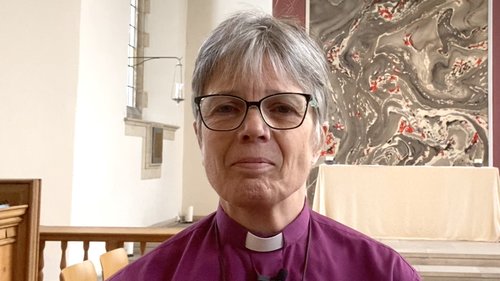Be a sign of resurrection to those most in need – Easter message 2022

In her Easter message, the Bishop of Monmouth, Cherry Vann, reflects on the importance of faith to the Ukrainian people and their need for spiritual and religious support as they re-settle in the UK.
The other day, I had the great privilege of meeting with Fr Jacob; an Orthodox priest based in Cardiff. His congregation is drawn from a large part of South Wales and is made up of people from Russia, Belarus and Ukraine.
The meeting had been set up to discuss how the churches in the Diocese of Monmouth could help and support Ukrainian families fleeing the violence of their homeland to seek safety and refuge in our country. The desire for us as a nation and as a church to offer a warm and generous welcome has been clear in so many conversations I’ve had recently, but I was keen to understand from him what he saw the needs as being.
The conversation was wide-ranging. We talked about how best to support host families and how to bring Ukrainian families from across south Wales together; about welcome centres and the spiritual care packages that he was planning to draw up and distribute; about our churches and church halls being places of welcome for prayer and for social gathering. And I was able to make him aware of the Social Responsibility Fund that we have set up and that is available to draw on to meet some of the needs.
What became abundantly clear as we talked was the centrality of faith and religious practice for the people of Ukraine. It’s embedded in their DNA; part and parcel of their daily lives. Asking for a blessing or for prayer from a priest walking down the street is perfectly natural and normal. It’s something, said Fr Jacob, that we in the west would struggle to understand.
The hosting and the caring and all the practical help we can give is vital and is going to remain so for many months, perhaps even years. But equally important for those fleeing Ukraine is the spiritual and religious support that we’re able to offer. Part of that will be ensuring that our churches are open and welcoming, perhaps with some of those spiritual care packages that Fr Jacob is putting together. But most crucially, it will be putting the families in touch with Fr Jacob and ensuring that they are able to get to the Orthodox Church in Cardiff for worship and fellowship.
It was as Fr Jacob was talking that I found my heart being stirred and warmed. What’s going on in Ukraine is horrifying beyond our imagining and those arriving on our shores will each have stories to tell that are heart-breaking. Good Friday is all too evident – the death, the anguish, the violence and the suffering is being lived and experienced in a way that we can’t begin to conceive. But in that conversation with one of a handful of Orthodox priests in Wales, I sensed signs of resurrection and good news. They may seem dim and flickering signs against the deep darkness of what we are witnessing, but they are signs nonetheless.
So it was on Easter Day – the risen Christ appears to two terrified women, he comes to Mary who thinks he’s the gardener and calls her by name, he walks to Emmaus with two troubled disciples and then disappears, he comes to the disciples gathered in a locked upper for fear of their lives. Small signs of life and light and hope and joy to a few, still reeling from the horror of seeing their Lord crucified.
The message of Easter is just that - one of light in the darkness, hope in despair, joy and peace in anguish and pain. It doesn’t deny the crucifixion in all its awfulness, but it transforms it as people encounter the light and life of the risen Christ in their daily lives and are changed by it, little by little.
Fr Jacob expressed deep gratitude for the solidarity that he was finding, not only in the willingness of people here to offer sanctuary and support, but in the willingness of Christians, here in Wales, to stand alongside, to pray and to care, and to reach out in love and support to their brothers and sisters. ‘I no longer feel alone’, he said, ‘but connected to and held in a wider Christian family.’
In our small, seemingly insignificant way, each of us can be signs of resurrection in our daily lives; bringing hope and comfort, light and life to those we meet, whether Ukrainian or not.
May God bless you this Easter as we celebrate the good news that Christ is risen. He is risen indeed. Alleleuia!